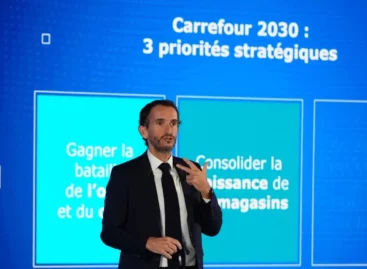With resilient optimism in 2021
At the April meeting of the Chain Bridge Club the experts PwC gave online presentations.
 PwC partner Anita Mekler analysed the results of the company’s annual CEO survey. This study revealed that in spite of the pandemic, both Hungarian and international executives are more optimistic about the growth rate of the world economy than ever before.
PwC partner Anita Mekler analysed the results of the company’s annual CEO survey. This study revealed that in spite of the pandemic, both Hungarian and international executives are more optimistic about the growth rate of the world economy than ever before.

Anita Mekler
partner
PwC
Anita Mekler said: PwC asked CEOs about the biggest risks in their own sectors. This year the pandemic was the No.1 concern for the 241 Hungarian and the 1,779 international CEOs. Lack of experts was named second – this was among the leading risk factors in the last five years.
The survey asked the representative of the FMCG sector: Which are those consumer behaviours that companies need to calculate with in the long run? 86 percent of Hungarian CEOs named e-commerce and at global level this was the answer the most CEOs gave, too. One of the main strategic objectives for executives is digital transformation. It is interesting that only a little more than 50 percent of Hungarian managers plan to invest in cyber security, while this proportion is 72 percent abroad.
The impact of digital transformation on two legal fields

Dr. László Szűcs
lawyer, member
Réti, Várszegi és Társai
Ügyvédi Iroda
PwC Legal
László Szűcs, a member of PwC Legal spoke about the changes in HR processes in connection with the digital transformation. He compared the HR processes that are taking place online to internet banking, where the employee has access to all instructions, contracts and internal rules they must comply with and use in their work.
Mr Szűcs told about the rules and regulations referring to online shops: the legislative background is sometimes very far from the actual situation in the rapidly developing e-commerce market. As for the relationship between GDPR and online shops, these days it isn’t the consumer who visits the online store, but the online store goes to the consumer. Once a customer visits an online shop, they leave a ‘digital footprint’ that retailers can use to monitor their online whereabouts, making personalised offers to them on different platforms. This activity is based on profiling, which is only allowed if the actors involved meet strict and detailed GDPR criteria.
When one hour is too much time…

Júlia Perger
manager of PwC’s CEE strategy and
transformation team
PwC
Júlia Perger, a manager of PwC’s CEE strategy and transformation team analysed the influence of the pandemic on the strategies of companies and on the world around us. The value of e-commerce, video conference platforms and the hygiene product market increased. Consumers switched from cash to digital payment, because they think it is safer.
Those companies could remain successful that were able to adapt to the new situation quickly. Consumption habits changed because people re-evaluated many things due to the pandemic. Back in 2018 shoppers wanted the products they ordered online to arrive within five days. Today in quick commerce even five hours are considered to be too many. As for food delivery businesses, it was a consumer expectation already before the COVID-19 pandemic to get their food in less than an hour. Many of these companies have realised in the pandemic period: if they can deliver food within 1 hour, they can also take anything else to shoppers’ doors. //
Related news
Carrefour Unveils 2030 Strategy, To Focus On France, Spain And Brazil
🎧 Hallgasd a cikket: Lejátszás Szünet Folytatás Leállítás Nyelv: Auto…
Read more >Related news
(HU) Pro-Duck Kft.
🎧 Hallgasd a cikket: Lejátszás Szünet Folytatás Leállítás Nyelv: Auto…
Read more >Iglo and Findus in new hands
🎧 Hallgasd a cikket: Lejátszás Szünet Folytatás Leállítás Nyelv: Auto…
Read more >








